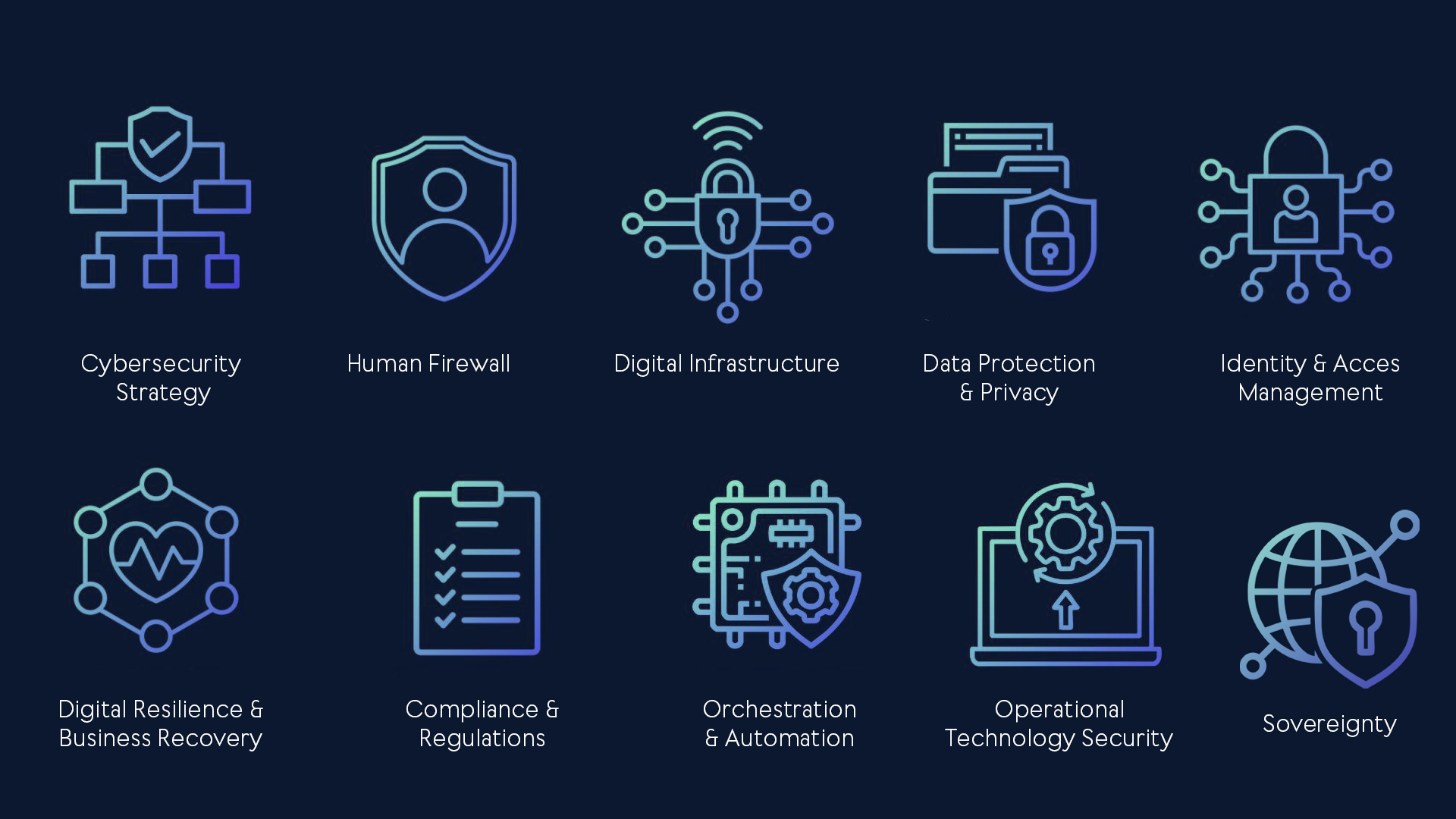
Themes
Visiting Cybersec Europe equips you with the essential expertise and tools to strengthen your business against cyber threats and safeguard your digital assets. With the invaluable insights, solutions, and expert network provided, your business gains the resilience to effectively tackle the continuously expanding cybersecurity landscape. Here are the key focal points that Cybersec Europe will address:
Cybersecurity Strategy
A well-defined cybersecurity strategy standardizes security, empowering CISOs to shift from reactive to proactive measures. It reduces security gaps, enhances threat visibility, and aids compliance adherence. With clearly defined roles and responsibilities, stakeholders collaborate to improve the organization’s security posture. A comprehensive cybersecurity strategy ensures readiness to combat relevant threats.
Core Topics:
- Zero Trust Security
- Security Framework & Defence Strategy
- Software Security
- OT/ICS Security
- 5G Network Security
- AI-Driven Cybersecurity Solutions
Human Firewall
As threats expand across distributed endpoints and exploit human vulnerabilities, an essential defense is the human firewall. Complementing technical firewalls, it comprises educated and incentivized individuals forming a vital layer of protection. A human firewall spans teams, functions, and technologies, safeguarding the organization comprehensively. A robust human firewall requires continuous training and cultural embedding to remain effective against evolving social engineering threats.
Core Topics:
- Social Engineering Prevention
- Cybersecurity Best Practise
- Employee Powered Security Services
- Phishing Simulation
- Incident Reporting Procedures
Digital Infrastructure
As digital transformation accelerates, resilient and secure digital infrastructure becomes the backbone of modern organizations. From on-premise data centers and colocation facilities to private, hybrid, and public clouds, the complexity of today’s IT ecosystems demands integrated security strategies. Digital Infrastructure focuses on securing the full stack—from physical and facility layers to virtualized and cloud-native platforms—while enabling agility, scalability, and compliance across connected, hybrid, and multi-cloud environments.
- IT governance strategy
- Public- & multi-cloud & hybrid infrastructurestrategy & security
- Remote work & distributed infrastructure security
- Infrastructure/platform/software as a service (i/p/saas) security
- Edge computing & network resilience
- Data center & colocation management & security
Data Protection & Privacy
In the modern corporate landscape, data plays a central role. Beyond confidentiality, the focus now shifts to data availability and integrity, becoming the forefront of security concerns. Personal identifiable information (PII) holds significant black-market and ransom value. To address breaches and misuse, user demand for transparency and control grows, while regulatory compliance becomes increasingly intricate.
Core Topics:
- Data Protection Regulations
- Data Loss Prevention
- Data Protection Technologies
- Data Privacy Guidelines
- Privacy-Enhancing Technologies (PETs)
Identity & Access Management
Organizations, even prior to the pandemic, were expanding globally, adopting distributed teams and remote work. The shift to distributed teams and remote work, accelerated by the COVID-19 pandemic, has made the traditional enterprise perimeter nearly obsolete. As a result, robust Identity & Access Management (IAM) is essential. Zero trust architectures enable granular control without relying on specific perimeter access enforcement points, meeting the evolving needs of modern organizations.
Core Topics:
- Identity Management
- Digital Identities & Authentication
- Access Control (SSO, MFA, PSK, Biometrics, Privileged Access)
- Identity Protection
- Zero Trust Implementation best practices
Resilience, Recovery & Supply Chain
Cyber resilience empowers organizations to achieve business acceleration through proactive preparation, response, and recovery from cyber threats. It enables adaptability in the face of various crises, challenges, and adversities, aiming to ensure organizational thriving despite adverse conditions.
Cyber recovery focuses on data restoration post-attack or breach, allowing uninterrupted operations through comprehensive recovery plans.
As third-party dependencies grow, supply chain security becomes equally critical. By integrating supply-chain visibility into resilience planning, organizations safeguard continuity even when external partners face cyber incidents.
Core Topics:
- Information Security Policies
- Vulnerability Monitoring & Security Monitoring
- Incident Response Management
- Business Continuity Management
- Backup & Restore Strategies
- Disaster Recovery as a Service
- Supply Chain Resilience & Third-Party Dependency Risk
Compliance & Regulations
Cybersecurity compliance involves implementing pre-defined security measures and controls to manage organizational risks and ensure data confidentiality. It emphasizes adhering to regulatory authorities, laws, and industry-specific controls for data management and protection. By following a systematic risk governance approach, companies demonstrate reliability and meet industry standards, instilling confidence in customers regarding service delivery.
Core Topics:
- Risk Governance
- Regulatory Cybersecurity Compliance Framework
- Data Breach Penalty Prevention
- Incident Response Plan
- Cross-Border Data Compliance Strategies
Orchestration & Automation/AI
- Automated Threat Detection & Response
- Workflow Automation
- Security Orchestration, Automation, and Response (SOAR)
- Integration of Cybersecurity Tools
- Policy Enforcement Automation
- Intelligent AI Security Automation
- AI-Driven Orchestration Techniques
Operational Technology Security
Operational Technology (OT) Security safeguards industrial systems, including manufacturing, energy, and critical infrastructure, against cyber threats. The increasing convergence of IT and OT also presents specific challenges. As OT networks increasingly integrate with IT environments, ensuring their resilience becomes essential. Protecting industrial control systems (ICS) and supervisory control and data acquisition (SCADA) systems from disruptions and unauthorized access is critical for operational continuity and safety.
Core Topics:
- Industrial Control Systems (ICS) Security
- Supervisory Control and Data Acquisition (SCADA) Protection
- IT-OT Convergence Security
- Industrial Cyber Risk Management
- Critical Infrastructure Protection
- Supply Chain Security for OT
- Physical Security Integration
Sovereignty
In an era of growing digital interdependence and geopolitical tension, digital sovereignty has become a strategic imperative. Governments and organizations are seeking greater control over their data, infrastructure, and technologies to ensure independence and reduce the risks of foreign interference. Sovereignty goes beyond compliance—it’s about building autonomy, choosing trusted technology partners, and creating resilient ecosystems that safeguard national and organizational interests.
Core Topics:
- Data Localization & Jurisdictional Control
- Sovereign Cloud Architectures
- Trusted Supply Chain & Vendor Selection
- Geopolitical Risk Mitigation
- Strategic Autonomy in Cybersecurity